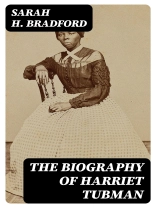In ‘The Biography of Harriet Tubman, ‘ Sarah H. Bradford offers an intimate and compelling portrait of one of America’s most pivotal figures in the fight for freedom. Through meticulous research and a narrative style that blends biography with evocative storytelling, Bradford illuminates Tubman’s perilous journey from enslavement to becoming a conductor on the Underground Railroad. The book captures not only Tubman’s extraordinary acts of bravery and strategic brilliance but also the broader historical context of slavery and the abolitionist movement, inviting readers to consider the complex interplay of personal courage and collective struggle during the 19th century. Sarah H. Bradford, a dedicated abolitionist and advocate for African American rights, was deeply influenced by the struggles of her time. Her passion for social justice and commitment to historical accuracy led her to interview Tubman personally, making this biography a unique primary source. Bradford’s empathetic approach reveals how Tubman’s experiences and hardships shaped her resilience and unwavering resolve, reflecting the broader aspirations for freedom held by countless individuals enslaved in America. Readers looking for an engaging and heartfelt exploration of Harriet Tubman’s life will find Bradford’s biography both informative and inspiring. It serves as a testament to the indomitable spirit of a woman who changed the course of history, making it essential reading for anyone interested in civil rights, American history, or the legacy of profound human courage.
Circa l’autore
Sarah Hopkins Bradford (1818 – 1912) was a 19th-century American writer and historian, who is best known for her early biographies of Harriet Tubman, a formidable figure in the abolitionist movement. Her works include ‘Scenes in the Life of Harriet Tubman’ (1869) and ‘Harriet Tubman, the Moses of Her People’ (1886), which collectively serve as valuable primary sources on Tubman’s extraordinary life and contributions to the Underground Railroad. Bradford’s literary style combined a narrative approach with biographical sketching, delivering rich, engaging accounts of Tubman’s heroics and the broader historical context of slavery in the United States. Her decision to write Tubman’s life story was also an effort to help alleviate the financial distress of the then unsung hero. Bradford herself faced financial difficulties and utilized her writing as a means of support. Her close access to Tubman and firsthand accounts given by Tubman and her associates lent authenticity to Bradford’s work, which resonates historical significance and remains an essential reading for those interested in Tubman’s legacy and the antebellum era. Bradford’s work not only elevated the legacy of Harriet Tubman but also helped to shape the way biographical narratives could serve social and historical purposes.












